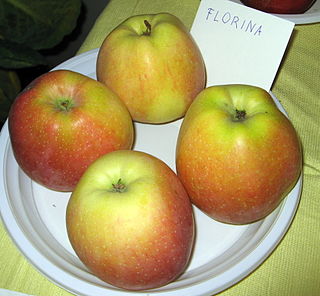
The Haralson is a cultivar of apple that is medium-sized and has a round-conic shape.

The Braeburn is a cultivar of apple that is firm to the touch with a red/orange vertical streaky appearance on a yellow/green background. Its color intensity varies with different growing conditions.

The 'Spartan' is an apple cultivar developed by R. C Palmer and introduced in 1936 from the Federal Agriculture Research Station in Summerland, British Columbia, now known as the Pacific Agri-Food Research Centre - Summerland. The 'Spartan' is notable for being the first new breed of apple produced from a formal scientific breeding program. The apple was supposed to be a cross between two North American cultivars, the 'McIntosh' and the 'Newtown Pippin', but recently, genetic analysis showed the 'Newtown Pippin' was not one of the parents and its identity remains a mystery. The 'Spartan' apple is considered a good all-purpose apple. The apple is of medium size and has a bright-red blush, but can have background patches of greens and yellows.

Ashmead's Kernel is a triploid cultivar of apple. Traditionally, Ashmead's Kernel was thought to be diploid but a poor pollinator.

Aurora Golden Gala is a cross between the apples 'Splendour' and 'Gala'. It was named in 2003 in a nationwide "Name the Apple" contest. Aurora Golden Gala is a yellow dessert apple. It is harvested mid-season. The fruit are medium in size, very crisp, juicy, aromatic, sweet, and they store well.

Beacon is a cold-hardy cultivar of apple developed by University of Minnesota in 1936. It is a cross between 'Wealthy' and 'Malinda' apples. This apple is medium in size with full, deep red stripes. Its flesh is pulpy and fairly soft, with a mildy sweet flavor. This apple is good for cooking and eating.

The Arkansas Black is an apple cultivar that originated in the mid-19th Century in Benton County, Arkansas. It is not the same as the cultivar 'Arkansas' or 'Arkansas Black Twig'.

The Foxwhelp is a very old cider apple cultivar, originating in the west Midlands of England.

A 'Stayman' is a triploid apple cultivar developed in 1866 by Joseph Stayman of Leavenworth County, Kansas; it was sold by nurseries from 1895. 'Stayman' apples remain a locally popular cultivar of apples where grown.

White Transparent is an early-season cultivar of apple which is usually used for cooking due to its sharp taste. It is sometimes said to be the same as 'Yellow Transparent', but 'Yellow Transparent' is sometimes described differently, with fine rather than coarse flesh, and a sub-acid rather than acid flavour. Weight 75 g,

Manks Codlin is an early cultivar selected from the domesticated apple that were growing at Isle of Man. It has many other names, including 'Winter Saint Lawrence' and 'Eva'. It first fruited in 1815. This cultivar is considered particularly cold hardy and well suited to exposed sites and poor soils.

Rajka is a hybrid cultivar of domesticated apple from Czechia, specifically for eating. It was crossed and developed by the Institute of Experimental Botany from the Champion and Katka apples for scab resistance and is possible to grow according to organic standards.

Pristine apple is a hybrid cultivar of 'Co Op 10' x 'Camuzat' domesticated apples, which are descendants of the 'McIntosh' apple and the 'Starking Delicious'. This cultivar was developed and patented in the United States by the PRI disease resistant apple breeding program, in Indiana, United States in 1994, for its resistance to apple scab. It is susceptible to cedar-apple rust.

'Alkmene' is a German cultivar of domesticated apple, also called 'Early Windsor'.

Åkerö, also called Akero or Okera, is an old apple cultivar of presumed Swedish origin, but possibly introduced from the Netherlands. It is a dessert apple with an aromatic flavor.

Florina which is also called Querina, is a French cultivar of domesticated apple, that has combined traits of the Jonathan, Golden Delicious and Rome apples, and was developed in Angers, France, by the "Station de Recherches d'Arboriculture Fruitiere". Although developed in France its ancestry is entirely American.

Red Astrachan is a cultivar of domesticated apple of either Russian or Swedish origin, which is an early season apple, juicy, tart and mealy texture with pleasant flavour, and use for eating, cooking and cider. It is medium-sized, crimson colored. As all the early season apples, it is not good for storage. It is known by several other names including 'Abe Lincoln', 'American Red', and 'Waterloo'.

Splendour, Splendor or Starksplendor is a modern cultivar of domesticated apple which was developed in New Zealand, and is regarded there as a popular commercial dessert apple. It has been said to be a cross between 'Red Dougherty' and 'Golden Delicious', but genetic analysis has not definitely characterized either of the parent cultivars, and records do not indicate known or suspected parents.
Yarlington Mill is a traditional cider apple cultivar originating from the village of Yarlington, in the North Cadbury area of Somerset, England.
This page is based on this
Wikipedia article Text is available under the
CC BY-SA 4.0 license; additional terms may apply.
Images, videos and audio are available under their respective licenses.

















